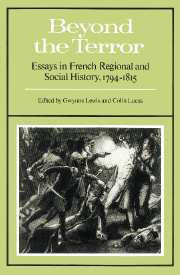Book contents
- Frontmatter
- Contents
- Contributors
- Preface
- 1 Cobb and the historians
- 2 The reconstruction of a church 1796–1801
- 3 Picking up the pieces: the politics and the personnel of social welfare from the Convention to the Consulate
- 4 Conscription and crime in rural France during the Directory and Consulate
- 5 Common rights and agrarian individualism in the southern Massif Central 1750–1880
- 6 Themes in southern violence after 9 thermidor
- 7 Political brigandage and popular disaffection in the south-east of France 1795–1804
- 8 Rhine and Loire: Napoleonic elites and social order
- Index
4 - Conscription and crime in rural France during the Directory and Consulate
Published online by Cambridge University Press: 04 November 2009
- Frontmatter
- Contents
- Contributors
- Preface
- 1 Cobb and the historians
- 2 The reconstruction of a church 1796–1801
- 3 Picking up the pieces: the politics and the personnel of social welfare from the Convention to the Consulate
- 4 Conscription and crime in rural France during the Directory and Consulate
- 5 Common rights and agrarian individualism in the southern Massif Central 1750–1880
- 6 Themes in southern violence after 9 thermidor
- 7 Political brigandage and popular disaffection in the south-east of France 1795–1804
- 8 Rhine and Loire: Napoleonic elites and social order
- Index
Summary
During the period of the Directory and the Consulate the Revolutionary Wars gradually lost their former libertarian glamour and turned into a seemingly endless campaign of attrition, accompanied by increasingly bureaucratic demands for additional manpower. The Loi Jourdan of Year VI abolished the revolutionary levées and replaced them with annual conscriptions, whereby men in their early twenties were placed in the military classes out of which the battalions would be drawn. And though hundreds of thousands of young men dutifully accepted the inevitability of their lot, there were many others, who themselves would number hundreds of thousands by the end of the Napoleonic campaigns, who resisted, either hiding in the surrounding hills, remaining unperturbed on their farms or deserting from their regiment before their service had even begun. Richard Cobb is right to see in these men a major element in the breakdown of law and order which so blighted this period in the French provinces. At a time when policing techniques were still in their infancy and the goodwill of the local community was essential if any respect for the law were to be maintained, the fact of resistance had implications far beyond the military context. Of course the success of the call to arms varied considerably from region to region, and indeed from village to village. Allegations of unfairness or of nepotism, of social differentiation whereby those with money or with family influence could avoid the rigours of services on the frontiers, of fraud in the organisation of the tirage on the village green, all could result in an ominous silence when the names of the communal battalion were read out to the villagers.
- Type
- Chapter
- Information
- Beyond the TerrorEssays in French Regional and Social History 1794-1815, pp. 92 - 120Publisher: Cambridge University PressPrint publication year: 1983
- 1
- Cited by

